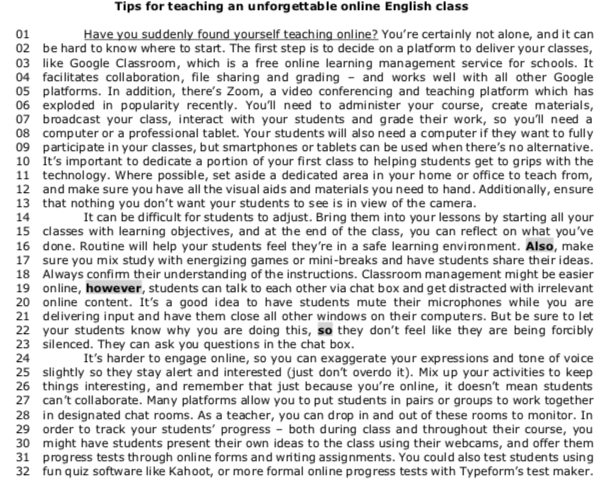Questões de Concurso
Sobre advérbios e conjunções | adverbs and conjunctions em inglês
Foram encontradas 575 questões
O texto seguinte servirá de base para responder à questão.
Pensioners face £1,000 fine if they don't get TV licence this week
1º§ The BBC confirmed it will start to charge everyone for the licence from August 1, so you only have until Saturday before the change comes in. Anybody who watches live telly has to pay for a licence. Brits over the age of 75 used to get free TV licences, but the benefit was axed last year - unless you claim pension credit.
2º§ The government stopped funding the free licences for over-75s in 2015, handing the responsibility over to the BBC. But the BBC last year announced it would also pull the plug on the initiative to save cash.
3º§ There was a transition period set up because of the coronavirus crisis, which meant anyone who couldn't afford a TV licence wouldn't be fined. But that all comes to an end this weekend, and anyone without a licence that needs one after the end date of July 31 will face the fine.
4º§ The BBC has said that more than nine in 10 over-75s households have already made arrangements for a paid licence, or updated changes in their circumstances to entitle them to a free one. In its latest update on the changes, the broadcasting house said it would otherwise write to the remaining 260,000 customers who hadn't yet made arrangements. Over 2,838,000 people now have a paid-for licence.
5º§ Since the over-75s have been forced to pay the annual fee, the BBC has reportedly raked in an extra £250million in licence fees, and this will only go up with the end of the grace period looming. You'll want to make sure to get a licence before the deadline or risk paying the hefty fine. 6º§ You need a TV licence to watch or record live programmes on any channel in the UK, or if you're watching something live on a streaming service too.
7º§ If you're using those services but you don't pay the fee then you could face prosecution plus a fine of up to £1,000. To get one, it's going to cost you £159 for a standard colour TV licence, otherwise it's £53.50 for a black and white one.
8º§ You don't have to pay for the licence if you're over 75 and on Pension Credit though, but you'll need to apply for a free licence on the TV licensing website or call 0300 790 6117.
9º§ You can apply for a TV licence online or by calling 0300 790 6165. The fee you pay will last you a whole year and starts from the day that you buy it.
10º§ You'll want to make a note of when this is so you know when to renew it next year too - after 12 months you'll have to pay the £159 (or £53.50) all over again.
11º§ You'll only need one per household and it doesn't matter how many people live with you. But if you or someone you live with is blind or severely sight-impaired, you can get 50% off the fee.
12º§ If you live in a residential care home or sheltered accommodation, you may be able to apply for a reduced licence which will normally cost you £7.50 instead. Plus if you're a student you don't have to pay yourself as you can be covered by your parents licence despite living away from home, but you can't watch something plugged into the mains in this case.
source(adapted):https://www.thesun.co.uk/money/15704333/pensioners-face-fine-for-no-tv-licence-this-week/
(Adapted):https://www.thesun.co.uk/money/15704333/pensioners-face-fine-for-no-tv-licence-this-week/
Consider the §12 and the following assertives:
I.The "residential care home" could be translated as "casa de repouso".
II.In the context of the sentence in the paragraph, the word "cost" is an adverb.
III.The word "apply" could be replaced by "request".
Which one(s) is(are) CORRECT?
Concerning the text above, judge the item below.
The word “likely” (ℓ.14) conveys the idea of probability.
 Disponível em >https://www.instagram.com/funny.english.memes/?hl=pt-br
Disponível em >https://www.instagram.com/funny.english.memes/?hl=pt-br 
Stanzel, V. New Realities in Foreign Affairs: Diplomacy in the 21st Century.
SWP Research Paper 2018, RP 11, November 2018,with adaptations.
Considering the vocabulary of the text, mark the following item as right (C) or wrong (E).
In line 5, the expression “by and large” could be
replaced with partially without changing the meaning
of the sentence.

(Avaliable in: https://www.cambridgeenglish.org/blog/12-tips-for-teaching-an-online-english-class/ – text adapted specially for this test).
Complete the sentence with the right adverbial clause.
“____bottles of milk do you want?”
Analise a sentença a seguir:
I like music so much, like rock, jazz “and” pop, “but” I don't listen music all the time, just in my free time “because” I work a lot all the day, I only turn on the radio when I “finally” get home.
Podemos afirmar que as palavras em destaque são marcadores discursivos e representam, respectivamente:
TEXT III

(Available at: https://www.glasbergen.com/gallery-search/?tag=learning. Accessed on October 26 , 2019)
TEXT III

(Available at: https://www.glasbergen.com/gallery-search/?tag=learning. Accessed on October 26 , 2019)

I- The words causes, refers and slow, in the text, are classified as verbs. II- In the first paragraph, the letter i in the word quarantine is pronounced differently compared to any letter i in the word distancing. III- The words could and would are examples of modal verbs used in the text. IV- In the text, the words very, severely and roughly are classified as adverbs.
Choose the alternative with the correct answer:
Answers the question according to the text below.
Organ Donation and Transplant
Answers the question according to the text below.
Organ Donation and Transplant
